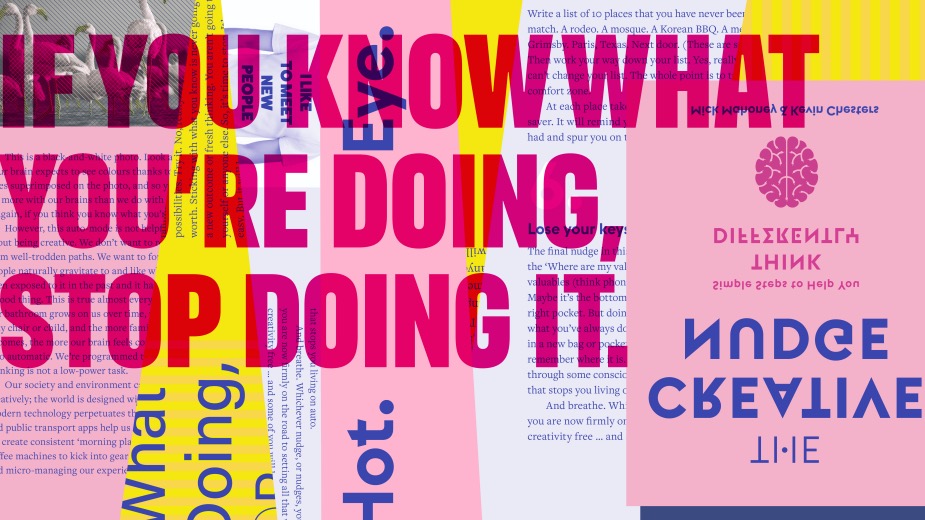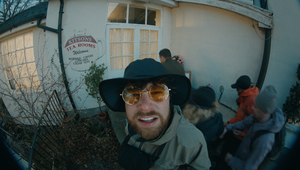
Everyone Can Be Creative – They Just Need a Nudge

My brain is being rewired. It feels… odd… but a lot less painful and bloody than I imagined. Fewer stray globules of grey matter. There’s no open brain surgery going on. I’m simply, at the request of Kevin Chesters who is sitting on the other end of a Zoom call with his partner Mick Mahoney, picking up my glass of water with my left hand (I’m a righty) and taking a drink.
I just about manage not to slaister water down my chin but there’s a tiny jarring discomfort as I realise how repetitive my motions can be, how much I run on autopilot.
“You are now medically and statistically proven to be more creative than you were ten seconds ago,” announces Kevin, triumphantly. “Just by using your non-dominant hand, you put a new neural pathway in your brain, which means you will think differently from this point onward. How easy was that?”
Creativity is More Than an Ad
What I’ve tried is one of the prompts in Mick and Kevin’s new book ‘The Creative Nudge: Simple Steps to Help You Think Differently’. The book draws on evidence-based behavioural science to offer up some surprising and digestible tips to help nurture creative thinking. It’s a book that’s been designed with a mass audience in mind (the pair argue that the book could benefit school kids, retirees and everyone in between), but its genesis lies in Kevin and Mick’s experience in the advertising industry.

Mick is creative partner at the Harbour Collective and Kevin is strategy partner there, and the two met while working at Ogilvy London, an agency renowned for its pioneering behavioural science practice. Mick was keen to find out if his suspicions about how creativity worked had any basis in science. At the same time, Kevin was finding that the way the advertising industry jealously gate keeps the term ‘creative’ was stimying the fluid way that the pair liked to work – heaven forfend a creative have a strategic insight or a strategist have a creative idea.
So, Kevin and Mick began working with behavioural scientists and researching the concept of creativity more broadly (what psychologists like to call ‘Big C’ creativity) and digging into the evolutionary, neurological, social, developmental mechanisms that help and hinder creative thinking.
“We make it really clear at the beginning of the book: we honestly believe everyone's born creative. We truly do. Why on Earth wouldn't we all be born with an innate, inbuilt, great creativity? People actually believe that in advertising agencies, unless creative is in your job title, you can't be creative, which is patently nonsense,” says Mick. “I'm fascinated by how we can stop creativity from just being this airy-fairy sort of crazy thing and instead, actually really try to put some structure around creativity to enable more people to be creative.”
One of Kevin and Mick’s greatest frustrations with the industry is its casual mis-definition of creativity. Frequently the word ‘creativity’ refers to the creativity of making an ad and nothing else. We use ‘ad’ and creative’ interchangeably as if they were synonyms. Out in the real world, they’re not. It’s the real world audience that Kevin and Mick are writing for (though they do think advertising folk could benefit from seeing creativity as a mode of thinking and a behaviour rather than simply a narrow kind of product made for a paying client).
Behavioural Economics for Everyone
At its core, the book draws insights from across psychology and neuroscience and leverages what the academic world is coming to learn about how malleable the brain is. But while every principle is backed by research, Kevin and Mick’s well-honed communication skills make it all accessible and clear to a general reader. Each chapter is structured around a particular tenet – ‘be unreasonable’ or ‘let chaos in’, for example – and the pair explore the obstacles thrown up by nature and nurture that make it difficult for us mere humans to embody that principle. Next comes a possible antidote and five or six nudges to try. That nudge at the beginning of eating or drinking with your weaker hand, functions as a disruption, highlighting just how many of our actions really do happen on auto pilot.

In the worlds of policy, advertising and business, behavioural economics and nudge theory are not new ideas. Indeed, they have been popularised by books like Richard Thaler’s Nudge, Daniel Kahneman’s Thinking Fast and Slow and Malcolm Gladwell’s Blink. But outside of certain circles, these ideas are not necessarily mainstream. Moreover, The Creative Nudge manages to create a raft of actions to try – it’s designed as an easily digestible toolkit rather than an off-putting wad of dense theory.
“One of my original thoughts - which Mick quickly disavowed me of - was that surely everyone already knows about all this behavioural science stuff and the rest of it,” laughs Kevin. “I mean everyone in planning does, people in government circles do and probably the mates of Rory Sutherland do, but actually most people don't. When I talk to my mum's friends or people in the park about this stuff, nobody knows about it. It's weird. It's almost like corporates and governments have kept all this to themselves, almost like it's an old secret. A lot of these nudge behaviours are just so easy to incorporate into our daily life.”
Perhaps the central takeaway is that enhanced creativity comes not from wishing and wanting and thinking very hard, but from changing our actions and trusting that will change how we think.
“Behaviour changes attitude yet attitude doesn't change behaviour,” says Kevin, simply. “So that's why you have to do things in order to change the way you think, which is really odd.”
Cowardy Custards and the Creative Impulse
But why do we even need these nudges if creativity is something that we’re all born with? Time, in the micro and macro sense, can dull our instincts. In the time scale of a single human life, a child’s propensity to daydream or make wildly counterintuitive leaps of imagination can be drummed out by schooling and societal attitudes. Children can be made to feel shame about being playful. Pressures and responsibilities can make creativity feel like a luxury. In the time scale of human existence, evolution has thinned out risk takers from the gene pool. Creativity isn’t just about thinking, it’s about action and some original solutions are more dangerous than others. Kev considers Dick Fosbury, the high jumper who pioneered the ‘Fosbury flop’. We now know that the backwards leap has increased the heights that elite high jumpers can reach but… it very easily might have resulted in paralysis.
“Thinking about things in new and different ways is the only way we can move forward as a species and it's the only way we ever did move forward as a species. Now, unfortunately for our evolutionary programming, the majority of cases of people doing these things got killed. They got eaten by a dinosaur or a mammoth or they choked to death on that red berry. And so, all your genes and my genes and Mick’s genes are these cowardy-custard cells from all the people who survive,” surmises Kevin.
Resistance is Creative
Ultimately the book is about making it a little bit easier to do something that’s hard – defying the magnetic pull of the path of least resistance. “So much of our behaviour is dictated by our belief that we have to fit in, go along with polite society and not be different when actually we do,” says Mick. “The only hope for humanity is that we will start to admit that we love dragons more and start doing all sorts of wonderful things.
“Unless you're prepared to go against the flow, you're a bit fucked really,” Mick continues. “And if you do want to approach the world in a more creative way because you want it to be a bit more fun and colourful, you are going to have to make it hard for yourself. And I think that's another reason why there's not a great deal of creativity in the world.”

It would be remiss not to mention the creativity of the book itself. The design is striking in its attempt to follow the ethos of the book’s message and the pair didn't take the easy route. Design consultancy Pentagram is responsible for the look of the book, which gleefully ditches publishing convention and toys with colour and layout. And the distinctive cover is by the one and only Noma Bar, who has dreamed up an iconic illustration that combines prodding fingers with a cross section of the contract included a right to have a substantial say in the book’s design – somewhat unusually - and it’s fair to say that the publishers hadn’t anticipated what happens when you give exacting ad folks that sort of reign.
What the World Needs Now...
The book’s publication has come at an interesting time. For one thing, we’ve spent the past year and a half in various forms of lockdown thanks to the Covid-19 pandemic. Depending on your viewpoint, it’s been a massive jolt that has forced us into new behaviours and given us space to explore creative avenues, or it’s been an uninspiring trudge, cutting us off from new experiences and locking us within our own small worlds. Either way, it feels like the book has arrived at the right moment.
It’s something that Kev feels strongly about. “Someone said to me, ‘isn't this a dreadful time to bring this book out, because hasn't everybody been sitting there, with their brains atrophying?’ And my answer was, ‘I don't think we could be further from the truth’. Over the first lockdown, the Open University saw a 622% increase in signups for creative courses, the most popular of which was creative writing. 50% of women in this country took up a new craft hobby during the first lockdown. I think, because we were ripped immediately, violently and involuntarily away from our normal overnight, suddenly we're making sourdough and gardening and all this shit. Now that we're coming out of Covid, I think the challenge is not to get people to think creatively. I think it's to protect it and nurture it and continue it.”
More broadly, the world is facing a series of intimidating, seemingly insurmountable challenges and it’s going to take an awful lot of creativity to imagine solutions. “I believe thinking differently about the world is what's going to what's going to solve the world,” says Kevin. “You're not going to solve the climate crisis, you're not going to solve a food crisis if we don’t have people thinking creatively. If we'd done vaccines the way we always do them, we'd still be on original development for the Covid one.”
Poignantly, just over a fortnight ago, the UK government confirmed plans to eviscerate university funding for arts courses, slashing it by 50%. This is despite the fact that creative industries contribute £111bn to the UK economy a year and the societal and mental health benefits of creativity are well documented. While one book is unlikely to reverse an act of colossal national self-harm, what it does contain are some valuable words of encouragement and tangible tools to help people keep their creative flame alive.
“I hope so. I think it's going to be a long journey of helping to push creativity to be more accessible, more discussed and more tangible for more people. That's the longer-term mission,” says Mick. “I've been blessed to have a lovely, creative, colourful, fun and interesting life as a consequence of my connection to creativity and I think that should be something that's accessible to everybody, no matter what your background is.”












